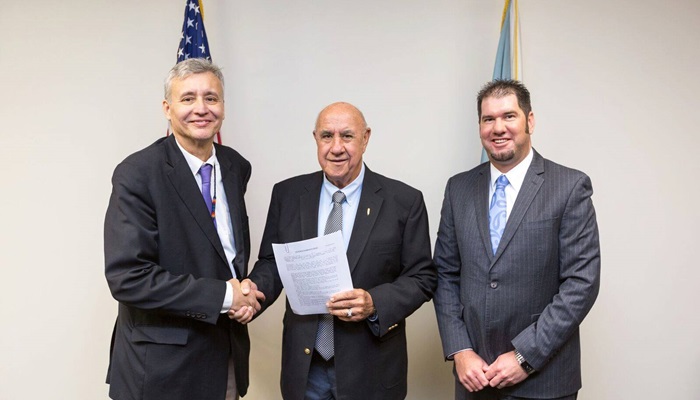In Oklahoma, the Shawnee Tribe plans to break ground in Guymon for the Golden Mesa Casino after on March 28 following a Texas County records check and site visit an official deed signing placing the 102.98-acre site in trust took place at the Anadarko, Ok office of the Bureau of Indian Affairs (BIA), according to KVll-TV.
Shawnee Chief Ron Sparkman (pictured center) said, “Today signifies an important advancement toward a project that will have a strong, positive economic impact on Texas County,” according to the news agency.
“We appreciate the Bureau’s discernment and care throughout this process. Along with our partners at Global Gaming Solutions, we look forward with great anticipation to becoming a member of the Panhandle community,” said Sparkman.
Plans for the long-awaited off-reservation casino include a 42,309 square foot gaming facility with approximately 600 electronic gaming machines, eight blackjack tables on a 20,206 square foot gaming floor, along with a restaurant and bar, retail space and office space for the tribe. Architects reportedly designed the entertainment venue to accommodate future expansion.
The city of Guymon is located in Texas County approximately 370 miles from the tribe’s headquarters in Miami, OK and was chosen by the tribe and its partners, Chickasaw Nation subsidiary, Global Gaming Solutions, due to land acquisition restrictions in the northeastern part of Oklahoma and opposition to previous projects in other areas of the state.
The once landless tribe pursued the casino under the two-part determination process outlined by the Indian Gaming Regulatory Act (IGRA), which is no small feat considering both the state and the federal government must approve the process.Nearly two years after first announcing the project, the environmental assessment was finalized by the BIA, and soon after Oklahoma Governor Mary Fallin followed suit.
The land into trust application was, however, inexplicably held up by the Trump administration for all of 2017, during which time two off-reservation applications in Michigan; the Sault Ste. Marie Tribe of Chippewa Indians which was seeking one site approximately 260 miles from its headquarters and the other site about 305 miles away from its headquarters, were rejected by the Department of the Interior in July 2017.
In a January 19 signing ceremony this year, approval was finally announced by U.S. Secretary of the Interior Ryan Zinke, according to the press release at the time. Upon completion, it is expected that the project will generate $30 million annually for the approximately 2,500 member tribe and create 200 permanent jobs.



